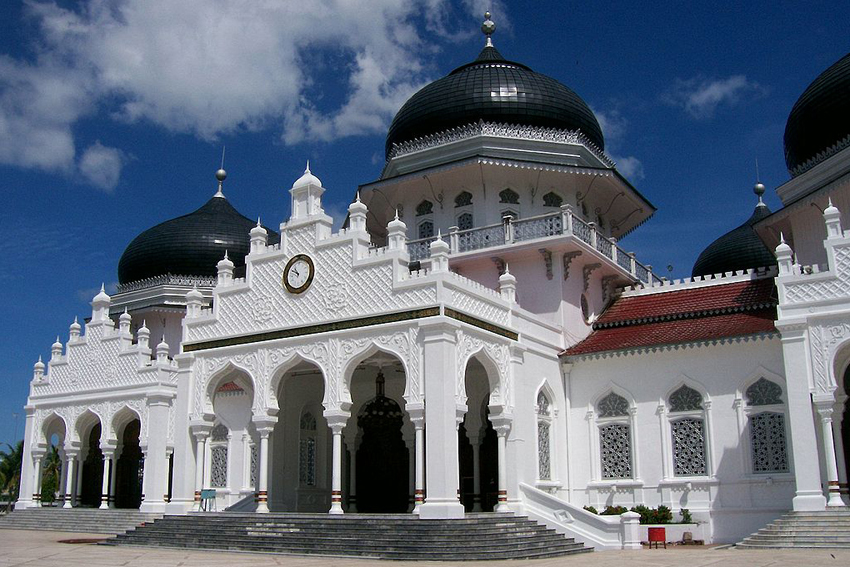With a national motto of “Unity in Diversity”, Indonesia is known as a secular and tolerant democracy, and it is looking to highlight its natural blessings and rich Islamic culture to attract the burgeoning halal tourism sector.

Despite having five official religions and hundreds of ethnic groups, Indonesia boasts the world’s largest Muslim population. According to a recent census, approximately 222 million people, or 87% of its population, follow Islam. Of this number the majority follow Sunni teachings.
Since the 12th century the religion has left a deep cultural footprint that can still be felt today. As kingdoms scattered across the archipelago converted to Islam, many Arabic words were adopted into local lexicons. Also, before the formation of the Republic of Indonesia, Malay, Acehnese and other native languages were often written in Arabic script. Numerous inscriptions on historical buildings remain from this period for visitors to see.
Aceh is perhaps best known for maintaining its traditional Islamic culture. The sultanate, which controlled the strategic territory until the 1800s, resisted outside influences until the final decades of Dutch colonial rule.
Many see Indonesia as an obvious location for halal tourism. The country offers year-round warm weather, affordable travel costs, and halal food is widely available. Places of worship are readily accessible with more than 600,000 mosques in place across the country.
Despite these advantageous conditions and strong religious, cultural and historical ties, the Middle East is not a major source of visitors for the country. As Minister for Tourism Arief Yahya admits, “Indonesia is the country with the world’s largest Muslim population but we have not fully explored halal tourism.” According to official statistics, in 2015 only 182,143 tourists from the MENA region visited Indonesia. Of the 12 million visitors expected by the end of 2016, government planners estimate only 300,000 will be of MENA origin.
However the Government of Indonesia has enacted a strategy to change this. A soft launch of halal tourism took place in 2012, which was followed by nominating 12 Muslim-friendly provinces in 2013. These areas – Aceh, West Sumatra, Riau, Lampung, Banten, Jakarta, West Java, Central Java, Yogyakarta, East Java, West Nusa Tenggara and South Sulawesi – serve as a geographic focus for halal tourism development. Halal tourism was also included in the national Islamic economic movements framework by President Susilo Bambang Yudhoyono in that year.
Ministerial regulations on Sharia hotels were created in 2014. This includes providing guests with halal food, Korans, marking the direction of Mecca in every room, offering access to a halal kitchen, and restricting alcohol consumption.
Other services on offer include the concept of ‘halal friendly tourism’. In addition to halal friendly hotels and halal restaurants, tours, trip planning and spas are also provided by tourism operators. The idea is to ensure a completely seamless experience for Muslim visitors.
Of the $200 million allocated to promote all forms of tourism, $29 million has been dedicated to attract guests interested in halal tourism. The MENA region has been the major focus of these efforts. The GCC in particular has seen a plethora of promotional activities launched by the Indonesian government. This is hardly surprising given the high number of travelers from the Gulf, as well as high income levels.
The Government of Indonesia has ambitious goals in increasing the number of Muslim tourists by 2019. As Minister Yahya explains, “I would like to increase visits for halal tourism to 5 million by 2019.” Already, quite early into the implementation of Indonesia’s halal tourism strategy, results are becoming apparent. Of the last two years, a 14.7% annual increase in Muslim visitors has been recorded.
International recognition for Indonesia’s development of this sector is also growing. The Sofyan Hotel Betawi (located in Jakarta) won the Best Halal Hotel award during the 2015 World Halal Travel Summit in Abu Dhabi. With only 14 award categories in total, Indonesia collected three awards in total. Lombok (one of the 12 nominated Muslim-friendly provinces) was rated Best Halal Tourism Destination and Best Halal Honeymoon Destination. Concerted efforts by the community and local operators here has made it Indonesia’s prominent halal tourism hotspot.
0 COMMENTS